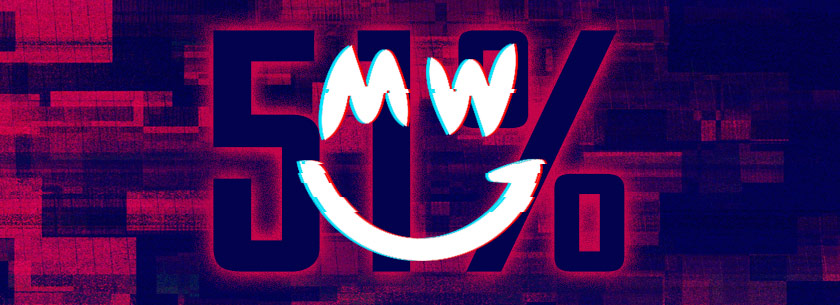On November 7, representatives of the 2Miners group of cryptominers announced in their official Twitter that an unknown group of individuals gained control of 57.4% of the entire hash power of the Grin blockchain, it means that the unknown carried out a successful 51 percent attack, taking over control of the block check.
The Grin blockchain is a project focused on high transaction confidentiality, and it is based on the Mimblewimble protocol. Most importantly, it was already somewhat centralized, as two large mining groups used to control a significant portion of the computing power. And they still do, but now these proportions have changed significantly. 2Miners - about 19.1%, and the Sparkpool group - 18.9.
Although at the moment the situation has only get worse. An unknown group holds 58.1 percent of the computing power. And they have already been able to reorganize one of the blocks. So far, it is not known with what results. However, the 2Miners organization has already begun to warn users about the potential danger of the current situation.
What's interesting, despite the issue the market price of the GRIN token decreased by only 1.3% in 24 hours. That means, the market does not yet react to potential danger. Which may not be a threat, since the motives of the new group are not known, and the situation with the consolidation of computing power is not new for Grin. The already mentioned Sparkpool at one time owned more than 60 percent of the hash rate, which does not affect the operation of the network in any way.
However, not all projects are this lucky. In August 2020, the Ethereum Classic network was hit by a successful 51 percent attack. Moreover - at least 3 times. Due to this, about 1000 blocks were reorganized. However, it was difficult. According to data from Crypto51, in order to keep most of the network under control, attackers had to spend about $ 7,000 an hour to provide the necessary computing power. With Grin, things are much simpler - control costs only $ 75 per hour.
51 percent attack is a huge problem for decentralized networks. Especially small ones. Through the use of powerful mining pools, attackers can completely intercept control over checking the contents of blocks, due to which they can fake transactions and withdraw funds from other people's wallets. And since most transactions on blockchains are irreversible, the consequences of interception can be disastrous.
Published on the EXBASE based on materials from cointelegraph.com





